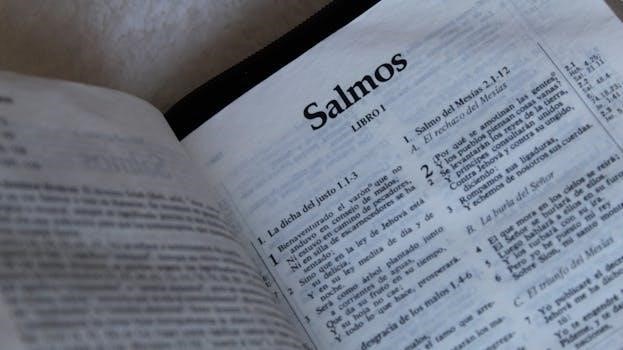Psalms PDF⁚ An Overview
The Book of Psalms‚ a treasure trove of ancient Hebrew poetry‚ is readily available in PDF format. These digital versions offer easy access to sacred texts‚ facilitating study and reflection on timeless prayers.
The Book of Psalms‚ a cornerstone of both Jewish and Christian traditions‚ is a collection of 150 sacred songs‚ poems‚ and prayers. These texts‚ traditionally attributed to King David and other authors‚ explore a wide range of human emotions and experiences‚ from joy and praise to sorrow and lament. The Psalms offer profound insights into faith‚ worship‚ and the relationship between humanity and the divine. They serve as a guide for prayer‚ a source of comfort‚ and a testament to the enduring power of spiritual expression. The Psalms are also valuable for teaching and confirming that Jesus is the Christ. Luther also uses the Psalms to describe the true church. Many PDF versions are readily available‚ offering a convenient and accessible way to engage with these timeless scriptures. These digital formats allow for easy searching‚ highlighting‚ and annotation‚ enhancing the study and appreciation of this rich literary and spiritual heritage. Psalms are a wisdom book in a special way because they require a connection with God and the expression of prayer. The Psalter is a beautiful collection of prayers.

Availability of Psalms in PDF Format
Numerous websites and online libraries offer Psalms in PDF format‚ making it easily accessible for study‚ prayer‚ and personal reflection. These digital versions are often free to download and use.
Free eBook Downloads
The digital age has ushered in unprecedented access to religious and spiritual texts‚ and the Book of Psalms is no exception. Numerous websites and online repositories offer free eBook downloads of the Psalms in PDF format. These resources cater to a diverse audience‚ providing versions in various translations‚ including the King James Version (KJV) and modern interpretations. For individuals seeking solace‚ inspiration‚ or academic study‚ these free eBooks present a convenient and cost-effective way to engage with this foundational work of religious literature. Many sites also offer accompanying materials‚ such as commentaries‚ study guides‚ and historical context‚ further enriching the reading experience. However‚ users should exercise caution and verify the source of the download to ensure the accuracy and integrity of the text. Some sources may contain errors or alterations‚ so it is advisable to compare different versions and consult reputable translations. Furthermore‚ users should be mindful of copyright restrictions and adhere to the terms of use specified by the website or publisher. By carefully selecting and utilizing these free resources‚ individuals can embark on a meaningful exploration of the Psalms and deepen their understanding of its enduring message. The availability of these eBooks democratizes access to this important text‚ making it accessible to a global audience regardless of their financial circumstances. This widespread availability fosters a greater appreciation for the Psalms and its continued relevance in contemporary society. The ease of access also facilitates the sharing and dissemination of the Psalms‚ promoting interfaith dialogue and cultural exchange.

Content and Themes within Psalms
The Psalms encompass diverse human emotions and spiritual experiences. Themes of praise‚ lament‚ thanksgiving‚ and repentance resonate throughout‚ offering solace and guidance to readers.
Psalms of Praise
Many Psalms are dedicated to praising God’s greatness‚ power‚ and faithfulness. These hymns often celebrate His creation‚ His deliverance of Israel‚ and His steadfast love for humanity. Passages overflow with adoration and thanksgiving‚ inviting readers to join in exalting the Divine. The Psalms of praise employ vivid imagery and poetic language to express the inexpressible wonder of God’s being and actions. They serve as models for worship‚ encouraging believers to express their gratitude and admiration through song and spoken word. These Psalms often highlight specific attributes of God‚ such as His justice‚ mercy‚ and holiness‚ inspiring awe and reverence. They remind us of the countless blessings we receive and the importance of acknowledging God’s presence in our lives. Through their joyful expression‚ Psalms of praise uplift the spirit and foster a deeper connection with the divine source of all goodness. They call us to focus on the positive aspects of our lives and to recognize the hand of God in every blessing. These Psalms encourage a heart of gratitude‚ transforming our perspective and filling us with joy. The rhythmic and lyrical nature of these Psalms makes them particularly suitable for musical settings‚ enhancing their impact and creating an atmosphere of celebration. Whether sung in unison or performed by choirs‚ Psalms of praise serve as a powerful expression of collective faith and devotion.
Psalms as Prayers
Beyond praise‚ the Psalms function as profound prayers‚ expressing a wide range of human emotions and experiences before God. These prayers encompass lament‚ confession‚ petition‚ and thanksgiving‚ reflecting the complexities of the human condition. Psalms of lament often voice sorrow‚ pain‚ and frustration in the face of suffering‚ seeking solace and deliverance from God. Confessional Psalms acknowledge sin and wrongdoing‚ pleading for forgiveness and restoration. Psalms of petition present specific requests to God‚ seeking His guidance‚ protection‚ and provision. Thanksgiving Psalms express gratitude for blessings received‚ celebrating God’s faithfulness and goodness. The Psalms as prayers provide a template for personal communication with God‚ offering language and imagery to articulate our deepest needs and desires. They demonstrate the importance of honesty and vulnerability in prayer‚ encouraging us to bring our authentic selves before the Divine. These Psalms remind us that God is a compassionate listener who cares about our struggles and joys. They offer hope in times of despair‚ assurance in times of doubt‚ and guidance in times of uncertainty. Through the Psalms‚ we learn to approach God with humility‚ reverence‚ and trust‚ knowing that He is always present and attentive to our prayers. The emotional depth and authenticity of these prayers resonate with readers across cultures and generations‚ providing a timeless source of comfort and inspiration. Whether recited in solitude or prayed in community‚ Psalms as prayers connect us to a rich tradition of seeking God’s presence and intervention in our lives. They teach us to express our faith through heartfelt supplication and to find solace in the unwavering love of the Divine.

Liturgical Use of Psalms
The Psalms hold a central place in liturgical worship across various religious traditions‚ particularly within Judaism and Christianity. Their poetic structure and profound theological themes make them ideally suited for communal recitation‚ chanting‚ and singing during religious services. In Jewish synagogues‚ Psalms are an integral part of the prayer service‚ recited on Sabbaths‚ festivals‚ and other holy days. Specific Psalms are associated with particular occasions‚ reflecting the themes and significance of the day. For example‚ Psalm 92 is traditionally recited on the Sabbath‚ celebrating God’s creation and rest. In Christian churches‚ the Psalms are incorporated into various forms of worship‚ including Morning Prayer‚ Evening Prayer‚ and the Eucharist. They are often sung as hymns or canticles‚ providing a powerful means of expressing praise‚ thanksgiving‚ and supplication. The Revised Common Lectionary‚ a widely used resource for liturgical planning‚ includes a selection of Psalms for each Sunday and major feast day‚ ensuring that the Psalms are regularly proclaimed and reflected upon in Christian communities. The use of Psalms in liturgical settings provides a connection to ancient traditions of worship‚ linking contemporary believers to the faith and practices of generations past. The repetitive and rhythmic nature of the Psalms facilitates communal participation‚ allowing worshippers to join together in a unified expression of devotion. Furthermore‚ the Psalms offer a diverse range of emotional and theological perspectives‚ enabling worshippers to engage with the full spectrum of human experience in the context of faith. Through their liturgical use‚ the Psalms continue to shape the spiritual lives of individuals and communities‚ fostering a deeper understanding of God and a more profound connection to one another. The Psalms serve as a bridge between the past and the present‚ uniting believers in a shared experience of worship and praise. Their timeless messages of hope‚ comfort‚ and guidance resonate with people of all backgrounds‚ making them an indispensable part of liturgical practice.

Authorship and Historical Context
The Book of Psalms‚ a collection of 150 individual poems and songs‚ represents a diverse range of voices and historical periods within ancient Israel. While traditionally attributed to King David‚ scholarly consensus suggests that the Psalms were composed by various authors over several centuries. David is credited with writing a significant number of Psalms‚ often referred to as the “Psalms of David‚” which reflect his experiences as a shepherd‚ warrior‚ and king. Other authors identified in the Psalms include Asaph‚ a Levite musician; the sons of Korah‚ a group of temple singers; and Moses‚ who is credited with Psalm 90. However‚ many Psalms remain anonymous‚ their authorship lost to history. The historical context of the Psalms spans a considerable period‚ from the time of the monarchy in the 10th century BCE to the post-exilic period after the return from Babylonian exile in the 6th century BCE. Some Psalms reflect the experiences of the Israelites during times of war‚ exile‚ and national crisis‚ while others express the joys of peace‚ prosperity‚ and religious devotion. The Psalms were likely used in various settings‚ including temple worship‚ royal ceremonies‚ and personal devotion. They served as a means of expressing praise‚ thanksgiving‚ lament‚ and supplication‚ reflecting the diverse emotional and spiritual needs of the Israelite people. Over time‚ the Psalms were compiled and edited into the collection we know today as the Book of Psalms. The final form of the Psalter likely took shape during the Second Temple period‚ reflecting the religious and cultural context of that era. Understanding the authorship and historical context of the Psalms provides valuable insights into the meaning and significance of these ancient poems and songs. By considering the perspectives of the authors and the historical circumstances in which they lived‚ we can gain a deeper appreciation for the enduring power and relevance of the Psalms.
